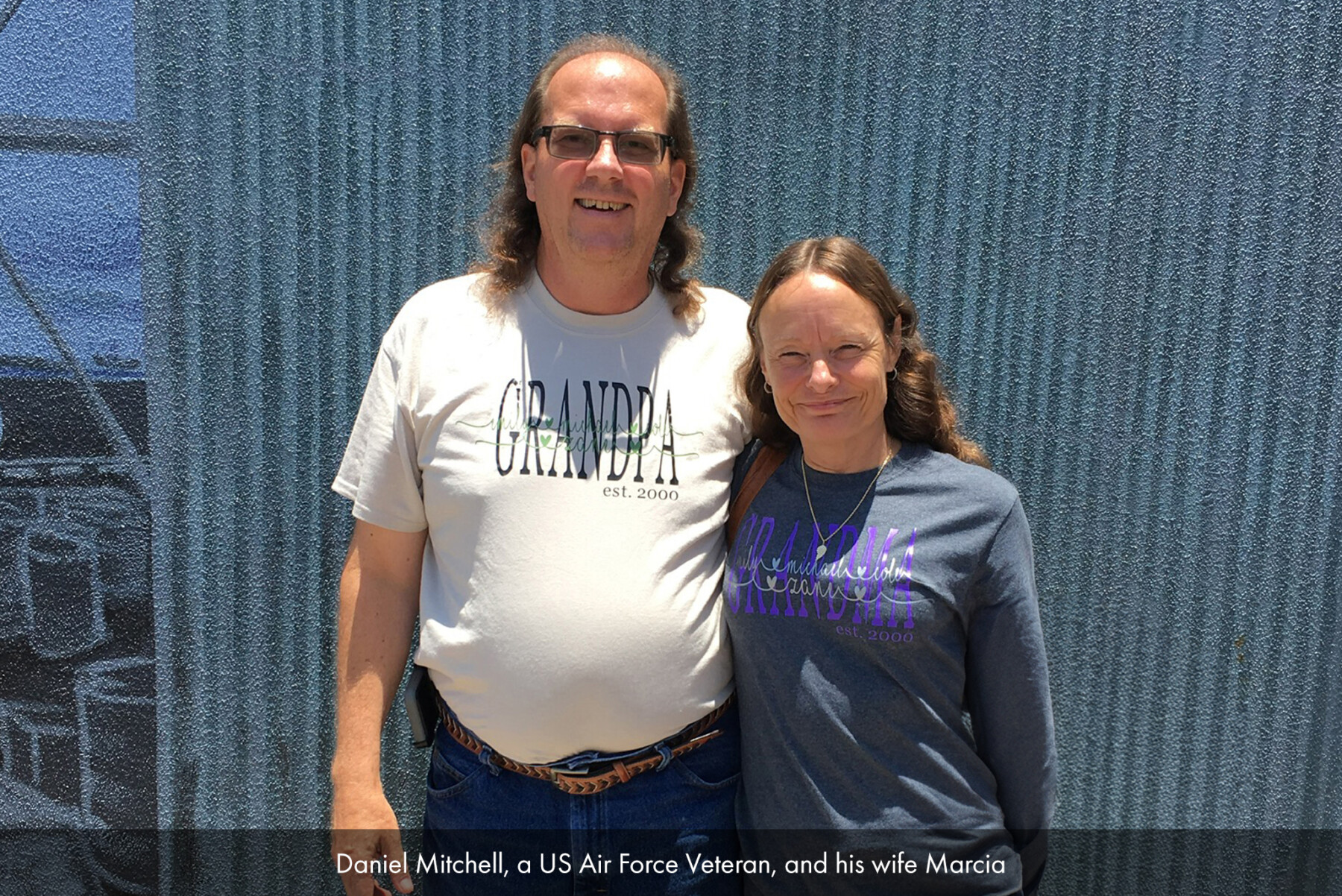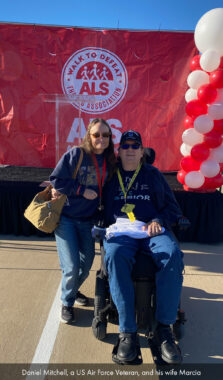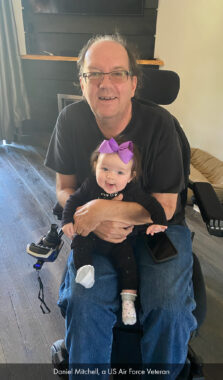Connection Opened Up My World While Living With ALS
This is a sponsored post written by Daniel Mitchell in collaboration with TPA
Written by |

This content is sponsored by Tanabe Pharma America, Inc. (TPA) and is intended for US audiences only. Any other present or future content posted by the contributor, not expressly designated as “Tanabe Pharma America, Inc. – sponsored content” is not associated with TPA.
Patient stories reflect the real-life experiences of persons diagnosed with ALS who have been prescribed RADICAVA ORS® (edaravone). However, individual experiences may vary. Patient stories are not necessarily representative of what another person using RADICAVA ORS® may experience.
These experiences are shared by patients and/or caregivers of patients on treatment at the time this content was created.
This is a real-life experience shared by an actual patient who is taking RADICAVA ORS®.
The information provided here is general in nature and is not intended to be a substitute for professional medical advice, diagnosis, or treatment. You are strongly encouraged to seek the advice of your doctor or other qualified healthcare provider with any questions regarding a medical condition.
Individual results may vary. Please see Important Safety Information below, full Prescribing Information, and Patient Information.
Veterans are more likely to develop ALS than those who haven’t served in the military, which is why TPA takes a moment each season to acknowledge all Veterans with this disease. Daniel, 62, is a retired Air Force veteran who was diagnosed with ALS in 2020. He lives with his wife and caregiver Marcia in Midlothian, TX, where he loves trainspotting and being with his family, two dogs, cat, and two horses.
The day I was diagnosed with ALS in 2020 came as a shock. I’m not sure whether my wife Marcia or I really understood what we were up against. The doctor said, “I’m sorry to tell you, but you have ALS, and that typically means an estimation of 3 to 5 years left to live.” We felt dejected as we were driving home from the doctor’s office, but it didn’t really sink in right away. I was overwhelmed with feelings of sadness and concern, and they crowded out anything else in those moments. As we drove, we talked about parts of our lifestyle that may need to change. We laid out different scenarios of what could happen, what having ALS might mean. But we didn’t know much about the disease at that time, so I felt a bit lost and didn’t have a clear picture in my head of what my future might look like. When we got home, the first thing we did was start calling up family members, reaching out to let them know about my diagnosis. Then we began researching ALS online.

Finding Allies in Fighting ALS
After the shock of getting diagnosed with ALS wore off, the first thing we did was connect with the United States Department of Veterans Affairs (VA) to see what my options were and what they could do for me. I was in the Air Force for 21 years and the VA has been an incredible resource. We go to the VA frequently for help with answering questions about the condition. And the cool thing is, we’ve been overwhelmed with support from the VA, which has made the fight against ALS a tiny bit easier. It’s hard to put into words what our future is going to look like. We know it’s going to be challenging, but seeing what we’re up against and feeling like we have such a great ally in the fight means the world to Marcia and me.
Learn more about support for Veterans with ALS and about RADICAVA® (edaravone).
Adapting to Changes Since Diagnosis
My legs were the first to go. Soon after receiving the ALS diagnosis, I noticed they were getting weaker. As my disease progressed, we adapted to the changes, which were slight at first. Every month, I would lose just a little more physical function. We moved back to Texas, where I had to give up driving because my legs were getting so weak that I couldn’t climb into my truck. Disappointed, I traded my driver’s license for an ordinary Texas ID instead. At that time, I was grateful that I could still walk with the aid of a walker, and my hands and my voice were both functioning okay. But over the last year and a half, there was a turning point where that, too, began to change.
My hands have become much weaker, and aside from a few words, I can’t speak anymore. I can type with one finger on each hand, and I can grasp things that are very light. Traveling has become more difficult.
When I went into the hospital for pancreatitis, I was glad to be released 4 days later, but then I was surprised to discover that I could no longer stand or walk. That was a huge adjustment for us, and that’s where I’m at today.
What I Wish I Knew When I Was Diagnosed
One thing I wish I’d mentally prepared for is that I wasn’t going to be able to talk. I guess I was naive about the disease because I know now that this is just the beginning, and I understand that it’s going to get worse. But I didn’t know just how much worse it would get until I started going through the changes at different stages. Communication is a big challenge because my wife Marcia and I used to talk all the time, and now it’s very limited. But after being married for 27 years, I’m grateful that we still have a close bond. I think about how ALS is affecting her, as well. She has home health counselors and nurses she can speak with that are provided by the VA, but she also has a support network that includes many friends, family members, and offers of help from our church.
Love and Support Makes All the Difference
As for me, I find connection and understanding in online support groups for people living with ALS. That’s where I met my online friend Juan and his lovely wife Meg who have also shared about their ALS journey.
I get a lot of strength and comfort from reading the stories of other people living with ALS. I’ve never met Juan and his wife in person, but I’d love to one day. Nobody can understand what you go through quite like someone who’s also walking in your shoes, and that kind of understanding makes you feel you’re not walking the path by yourself. It’s a relief to have someone by my side—whether it’s having friends like Juan, or my incredible wife Marcia, with her constant love and support.
What RADICAVA ORS® Means to Me
When I spoke with my doctor about a treatment plan for my ALS, she recommended a couple options. We didn’t choose RADICAVA® at the time because it was only available in an IV form, and I’m not very fond of needles, so we went with another treatment. I was on another treatment for about two years when my wife Marcia came to me with some research she’d done and brought up the option of RADICAVA ORS®.
Marcia read many stories about people who had taken it, and I was excited because I’d heard of RADICAVA® from my doctor, but once it was available in the oral form, I wanted in! I spoke with my doctor, and she told me that in a clinical study, people taking RADICAVA® lost 2.49 fewer points on a scale that rates physical function compared with people who didn’t take RADICAVA®. After we’d talked more about it, including the side effects, she was comfortable to prescribe it for me. I’ve been taking RADICAVA ORS® for two months now. The decision to get started on RADICAVA ORS® is something I feel very good about.
In the clinical study, RADICAVA® (edaravone) slowed the loss of physical function as measured by the ALS Functional Rating Scale–Revised (ALSFRS-R). At 24 weeks (about 6 months), patients who did not receive RADICAVA® (66 patients) declined more rapidly in physical function, having lost an average of 2.49 points more than those who received RADICAVA® (68 patients). Common side effects reported include bruising (contusion), problems walking (gait disturbance), headache and fatigue. These are not all the possible side effects of RADICAVA ORS. Talk to your doctor about all the benefits and risks associated with treatment.
RADICAVA ORS® (edaravone) is indicated for the treatment of amyotrophic lateral sclerosis (ALS).
Do not receive RADICAVA ORS® (edaravone) if you are allergic to edaravone or any of the ingredients in RADICAVA ORS.
See Important Safety Information below and click here for full Prescribing Information and Patient Information.
Learn more about ALS and how RADICAVA ORS® may help you.
Living One Day at a Time With ALS
These days I keep busy with things I enjoy. I’ve always loved trains, both trainspotting in real life and playing a train game on my computer. I’m also a big fan of watching murder mysteries on TV. This past Thanksgiving, I was able to spend time with my loved ones, some of whom are scattered all over the country, so that was a very special time for me. Making each day count and making the most of every day I’m given is what I’m focusing on.
It may seem terrible to some, but living as if each day is your last is all you can do. And if you can manage it, there is peace to be found in living that way. I take less for granted and make life as happy and memorable as possible. I still have so much to look forward to. I’m planning to take care of my bucket list. Marcia and I would like to go on a cruise, and I’d love to visit Disney World. I’m still a big kid at heart! Marcia is very adventurous; she’d like to see Australia and go hang gliding. But more than anything, I’m looking forward to spending more happy times with friends and family, whenever I can.

How I Hope Sharing My Story Helps Others
The reason I’m moved to share my story is that I want to show people that there are still positive things that can happen while living with ALS. If someone gets a diagnosis like this, it doesn’t mean they should just give in and give up.
Before my diagnosis, I didn’t realize how many people there were who were fighting ALS—in fact, I was shocked to learn how many of us there are! But connecting with others like me has opened up my world. Reach out to other PALs, share knowledge, share your emotions, share a laugh. You never know who needs to hear your story, too.
The Share Your Story program allows real people living with ALS and/or their caregivers to share their own experiences of living with ALS and why treatment with RADICAVA® or RADICAVA ORS® matters to them.
Learn more about participating in the Share Your Story program at ShareYourALSStory.com.
INDICATION
RADICAVA ORS® (edaravone) is indicated for the treatment of amyotrophic lateral sclerosis (ALS).
IMPORTANT SAFETY INFORMATION
Do not receive RADICAVA ORS® (edaravone) if you are allergic to edaravone or any of the ingredients in RADICAVA ORS.
Before you take RADICAVA ORS, tell your healthcare provider about all of your medical conditions, including if you:
- have asthma.
- are allergic to other medicines.
- are pregnant or plan to become pregnant. It is not known if RADICAVA ORS will harm your unborn baby.
- are breastfeeding or plan to breastfeed. It is not known if RADICAVA ORS passes into your breastmilk. You and your healthcare provider should decide if you will receive RADICAVA ORS or breastfeed.
Tell your healthcare provider about all the medicines you take, including prescription and over-the- counter medicines, vitamins, and herbal supplements.
What are the possible side effects of RADICAVA ORS?
RADICAVA ORS may cause serious side effects, including hypersensitivity (allergic) reactions and sulfite allergic reactions.
- Hypersensitivity reactions have happened in people taking RADICAVA ORS and can happen after your medicine has been taken.
- RADICAVA ORS contains sodium bisulfite, a sulfite that may cause a type of allergic reaction that can be serious and life-threatening. Sodium bisulfite can also cause less severe asthma episodes in certain people. Sulfite sensitivity can happen more often in people who have asthma than in people who do not have asthma.
- Tell your healthcare provider right away or go to the nearest emergency room if you have any of the following symptoms: hives; swelling of the lips, tongue, or face; fainting; breathing problems; wheezing; trouble swallowing; dizziness; itching; or an asthma attack (in people with asthma).
Your healthcare provider will monitor you during treatment to watch for signs and symptoms of all the serious side effects and allergic reactions.
Common side effects reported include bruising (contusion), problems walking (gait disturbance), headache and fatigue. These are not all the possible side effects of RADICAVA ORS.
Call your doctor for medical advice about side effects. You may report side effects to FDA at 1-800-FDA-1088. You may also report side effects to www.fda.gov/medwatch or Tanabe Pharma America, Inc. at 1-888-292-0058.
Please see the full Prescribing Information and Patient Information, also available at www.radicavaors.com.
RADICAVA and RADICAVA ORS are registered trademarks of K.K. BCJ-94.
Intended for US Residents Only.
© 2025 Tanabe Pharma America, Inc. All rights reserved.
CP-OE-US-1377 12/25





